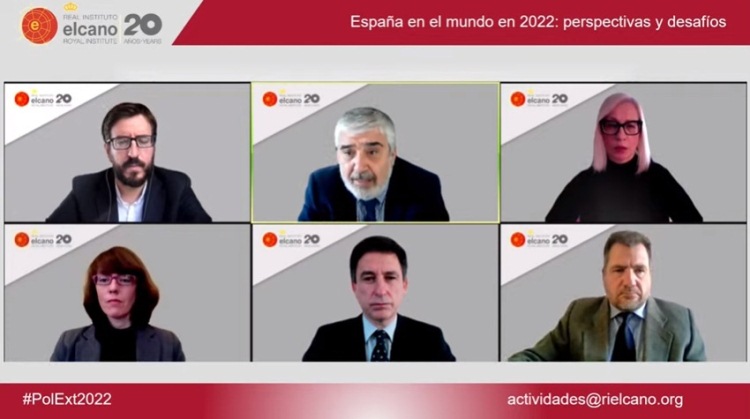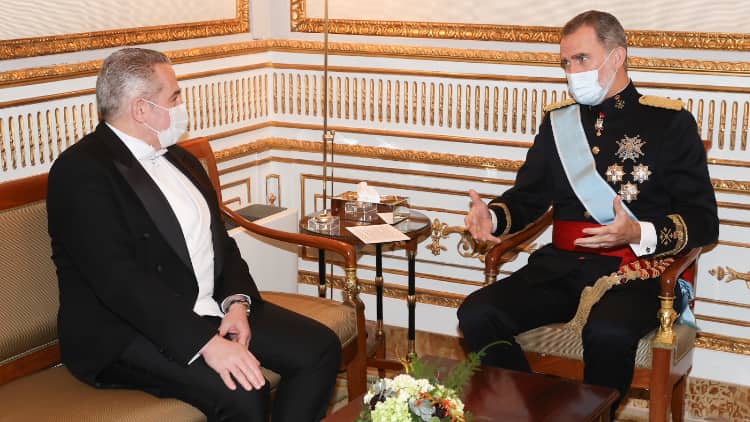Eduardo González
The Elcano Royal Institute believes that Spain, “a nodal middle power with the capacity to influence”, can and must increase its projection abroad in the face of the great challenges facing the world in 2022.
These are some of the main conclusions of the report Spain in the world in 2022: prospects and challenges, which was presented yesterday by videoconference and addresses the challenges of Spanish foreign action from ten axes of analysis: influence and external image, economy and technology, climate and energy, Europe, US-China competition, security, neighborhood, Latin America, democracy, rights and citizenship and globalization, development and governance.
“Spain is not a great power, but it is a medium power, a nodal country, with the capacity to influence,” said one of the coordinators of the report, Ignacio Molina, during the event, which was presented and moderated by José Juan Ruiz, president of the Elcano Royal Institute.
According to the researcher, Spanish foreign action should be favored by the “great social consensus” that exists in Spain with respect to “the substance of foreign policy, security, development cooperation and insertion in globalization”. However, he regretted, this consensus, “which would be envied by many Western democracies”, contrasts with “a very high political polarization, which is detrimental to Spain’s capacity to project itself abroad”.
In any case, according to Molina, foreign action can also be favored by the current “restructuring of the Ministry of Foreign Affairs” and by its greater availability of means thanks to “an expansive budget in foreign action”, which devotes “more money to development cooperation, to the reform of the cooperation system, to defense and to cultural action abroad” and which should help “to recover foreign action soon after two traumatic years of pandemic”.
In these conditions, he affirmed, foreign action must “maximize Spain’s influence in the EU in the face of the new Franco-German axis (after the change of government in Berlin and on the eve of a new electoral cycle in Paris)” and increase Spain’s contribution “to the great European debates, such as strategic autonomy, the rule of law in Hungary and Poland and the reform of the migratory system”.
Defense and Security and the Eastern and Southern Neighborhoods
Another of the authors of the report, Luis Simón, stated that Spain is also “called to play a leading role” in the two great security and defense challenges of 2022: “the EU Strategic Compass, which will set the EU priorities in security and defense and is expected to be approved this spring, during the French presidency”, and the next NATO Summit, which will be organized precisely by Spain and will be held in Madrid in June of this year.
“The Madrid Summit is presented in NATO circles as historic” because “it is not just any summit,” he said, “It is called to play a key role in the process of adapting NATO to a world that is marked by the return of strategic rivalry between great powers,” he continued. Besides, the Summit offers the double opportunity to increase “the visibility of Spain in strategic issues”, including the contribution of our country to the Alliance, and “to promote the defense culture in Spain”, which has a “low perception” in the Spanish society.
For her part, the researcher Mira Milosevich warned that Spain must also “gain prominence” in the two EU Neighborhoods, the Eastern and Southern Neighborhoods, “which are a scenario of rivalry between great powers and in which the absence, at times, of the EU is very striking”.
In the case of the Eastern Neighborhood, “Russia’s interest is to maintain its zone of privileged interest” and, to this end, it does not hesitate to resort to “conventional and non-conventional” means in order to prevent the rapprochement of the Eastern countries to the EU or NATO and to generate instability in the Eastern Neighborhood. In the case of the Southern Neighborhood, she continued, the greatest risk is “regional tension Morocco Algeria.” “A military conflict between Algeria and Morocco is not probable, but it is not entirely impossible either, and it would have consequences for Spain, such as an increase in the migratory flow and the destabilization of the whole region,” she warned. In any case, she said, “both Russia and Morocco have demonstrated their willingness to use unconventional instruments that are sometimes not perceived as security challenges, such as the use of migration to threaten stability, as we have seen in Spain, in Ceuta, and we see in Belarus, on the border with Lithuania and Poland.”
Also participating in the presentation of the report were researchers Lara Lázaro, who focused on energy challenges (“gas and oil supplies are guaranteed, but prices are expected to be high”) and climate change (“for Spain, 2022 will be the year of the implementation of the Climate Change and Energy Transition Law, and the reforms of the Recovery, Transformation and Resilience Plan will be an opportunity to boost the energy transition”), and Enrique Feás, who addressed the “destabilizing factors of the economy in 2022”: inflation growth, which “is likely to last longer than desirable”; geopolitical factors, which very directly affect gas distribution; and the relations of the EU and Spain with the UK after Brexit.







